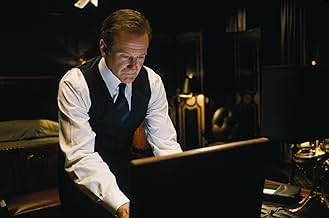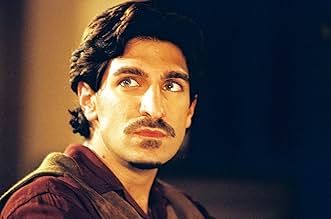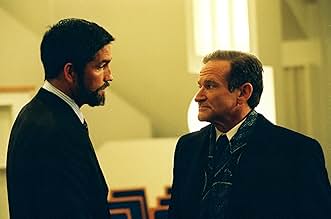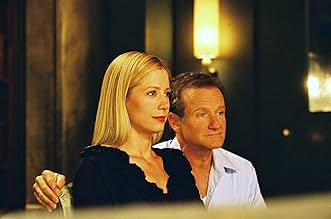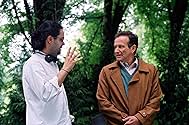AVALIAÇÃO DA IMDb
6,1/10
35 mil
SUA AVALIAÇÃO
Num mundo onde há chips que gravam a vida de uma pessoa vive Alan, o melhor editor de filmes Zoe que existe. Contudo, ele sofreu um trauma na infância que o levará a tentar identificar num d... Ler tudoNum mundo onde há chips que gravam a vida de uma pessoa vive Alan, o melhor editor de filmes Zoe que existe. Contudo, ele sofreu um trauma na infância que o levará a tentar identificar num desses filmes uma pessoa que deveria estar morta.Num mundo onde há chips que gravam a vida de uma pessoa vive Alan, o melhor editor de filmes Zoe que existe. Contudo, ele sofreu um trauma na infância que o levará a tentar identificar num desses filmes uma pessoa que deveria estar morta.
- Direção
- Roteirista
- Artistas
- Prêmios
- 1 vitória e 4 indicações no total
Tarek Bishara
- Hasan
- (as Thom Bishops)
Avaliações em destaque
"The Final Cut" is a dark cross between "Eternal Sunshine of the Spotless Mind", "One-Hour Photo" and "Citizen Kane."
While this is an original screenplay by writer/director Omar Naim, it is faithful to a Philip Dick-type imagining of a techno-world in the not-so-distant future, with the bleakness, of both the excellent production design, cinematography, music and the story, only briefly mitigated.
I like how gradually we see the explanations and issues of memories from many different view points and issues, while one lives and dreams and how one lives on in other people's memories, as a multiplier effect in touching other people and our own souls.
Just as the interviews of family recall the journalist trying to understand Kane, the fine scene is a nice visual play on his famous mystifying "Rosebud," ironically demonstrating that someone outside one's head can never understand what is significant and meaningful to an individual, what goes into making that unique personality.
While I'm not sure it's such a bombshell that eulogies --in this case as visually edited "re-memories" culled from brain implants--are whitewashes (as pointedly satirized by Tom Wolfe in "Bonfire of the Vanities") and the political protesters seemed almost to be satirically out of a T. C. Boyle novel, James Caviezel's seriousness keeps them out of Unabomber territory.
One awkward miscast is Mira Sorvino. As if it's not already obvious why a Robin Williams would be attracted to a blonde bombshell, another layer of motivation is added, but it just makes absolutely no sense why she was drawn to him. Not only does this seem yet another instance of film's older man/younger woman tendencies, the character would have made a lot more sense as an older woman with a past.
The effective multiple screens showing the editing of "re-memories" may be difficult to distinguish on the eventual DVD, but I wasn't sure if the blown-up look was from projection issues.
While this is an original screenplay by writer/director Omar Naim, it is faithful to a Philip Dick-type imagining of a techno-world in the not-so-distant future, with the bleakness, of both the excellent production design, cinematography, music and the story, only briefly mitigated.
I like how gradually we see the explanations and issues of memories from many different view points and issues, while one lives and dreams and how one lives on in other people's memories, as a multiplier effect in touching other people and our own souls.
Just as the interviews of family recall the journalist trying to understand Kane, the fine scene is a nice visual play on his famous mystifying "Rosebud," ironically demonstrating that someone outside one's head can never understand what is significant and meaningful to an individual, what goes into making that unique personality.
While I'm not sure it's such a bombshell that eulogies --in this case as visually edited "re-memories" culled from brain implants--are whitewashes (as pointedly satirized by Tom Wolfe in "Bonfire of the Vanities") and the political protesters seemed almost to be satirically out of a T. C. Boyle novel, James Caviezel's seriousness keeps them out of Unabomber territory.
One awkward miscast is Mira Sorvino. As if it's not already obvious why a Robin Williams would be attracted to a blonde bombshell, another layer of motivation is added, but it just makes absolutely no sense why she was drawn to him. Not only does this seem yet another instance of film's older man/younger woman tendencies, the character would have made a lot more sense as an older woman with a past.
The effective multiple screens showing the editing of "re-memories" may be difficult to distinguish on the eventual DVD, but I wasn't sure if the blown-up look was from projection issues.
In six words: great idea-not so great execution. In a slightly vague future, Robin Williams plays a video editor named Alan, his job is assembling 1-2 hour video portraits of deceased clients whose parent's were well off enough to have had them fitted (while still in the womb) with a "Zoe" implant. Named after the corporation that initially developed this device, the implant records (24-7) everything that happens to a person during their lifetime. It is important to the story that viewers understand that these are not memories but actual recordings. This distinction is critical to the plot as well as to one of the interesting questions posed by the film; to what extent have our actual memories been distorted by time.
The editors (called cutters) must distill down this lifetime of footage into a brief highlights video, discretely deleting scenes that would be offensive to the family of the decreased. This is not that different than the writers of obituary notices (see "Closer"). The video is shown at a special memorial service called a "rememory". To add some unnecessary complexity to the story there is a violent protest group who object to the whole concept. The basis of their objection is never adequately explained but seems to be centered on the fact that the footage is by necessity all from the person's own "point-of-view", with the protesters chanting "remember for yourself".
Of course a Cutter sees everything (mostly in fast motion) making him or her privy to a person's every secret and sin. In the film they briefly raise the most interesting question posed by this whole idea, if you knew that someone (be it man or God) would replay your entire life, to what extent would it change your behavior? In the film most (but not all) people with the implant are aware that they have it.
Knowing all this stuff makes Alan a lonely man. His philosophy: "The dead mean nothing to me, I took this job out of respect for the living", has caused him to avoid close interpersonal relationships, which might compromise the many confidences he is keeping. Within the closed community of cutters he is known as a "Sin Eater" because of his willingness to sanitize the lives of the scum of the earth, accepting clients that the other cutters reject. Williams looks even sadder and more depressed than in did in "What Dreams May Come". It is a extremely restrained performance, not especially challenging but perfectly suited to the mood of this film.
Alan gets in trouble when he takes on a project for a rich widow (Stephanie Romanov). Her husband knew a lot of corporate secrets and had been playing around with their young daughter. This "messing around with something much bigger" has a Raymond Chandler feel to it, and this fits nicely with what might be called a futuristic film noir production design.
Overall the many interesting ethical and philosophical questions raised by "The Final Cut" are more interesting than the film itself. In fact, there is so little real suspense and character identification that the viewing process is mostly an exercise in pulling yourself back from your contemplation of earlier scenes so that you can follow what is happening on the screen.
The film goes wrong by introducing a parallel story about Alan's childhood. While well handled, it fails in its purpose of explaining his adult motivations. By the end we care nothing about his character or his actions and are back to day dreaming about the many issues the film raises but does not adequately address.
Then again, what do I know? I'm only a child.
The editors (called cutters) must distill down this lifetime of footage into a brief highlights video, discretely deleting scenes that would be offensive to the family of the decreased. This is not that different than the writers of obituary notices (see "Closer"). The video is shown at a special memorial service called a "rememory". To add some unnecessary complexity to the story there is a violent protest group who object to the whole concept. The basis of their objection is never adequately explained but seems to be centered on the fact that the footage is by necessity all from the person's own "point-of-view", with the protesters chanting "remember for yourself".
Of course a Cutter sees everything (mostly in fast motion) making him or her privy to a person's every secret and sin. In the film they briefly raise the most interesting question posed by this whole idea, if you knew that someone (be it man or God) would replay your entire life, to what extent would it change your behavior? In the film most (but not all) people with the implant are aware that they have it.
Knowing all this stuff makes Alan a lonely man. His philosophy: "The dead mean nothing to me, I took this job out of respect for the living", has caused him to avoid close interpersonal relationships, which might compromise the many confidences he is keeping. Within the closed community of cutters he is known as a "Sin Eater" because of his willingness to sanitize the lives of the scum of the earth, accepting clients that the other cutters reject. Williams looks even sadder and more depressed than in did in "What Dreams May Come". It is a extremely restrained performance, not especially challenging but perfectly suited to the mood of this film.
Alan gets in trouble when he takes on a project for a rich widow (Stephanie Romanov). Her husband knew a lot of corporate secrets and had been playing around with their young daughter. This "messing around with something much bigger" has a Raymond Chandler feel to it, and this fits nicely with what might be called a futuristic film noir production design.
Overall the many interesting ethical and philosophical questions raised by "The Final Cut" are more interesting than the film itself. In fact, there is so little real suspense and character identification that the viewing process is mostly an exercise in pulling yourself back from your contemplation of earlier scenes so that you can follow what is happening on the screen.
The film goes wrong by introducing a parallel story about Alan's childhood. While well handled, it fails in its purpose of explaining his adult motivations. By the end we care nothing about his character or his actions and are back to day dreaming about the many issues the film raises but does not adequately address.
Then again, what do I know? I'm only a child.
Set in a world with memory implants, Robin Williams plays a cutter, someone with the power of final edit over people's recorded histories. His latest assignment is one that puts him in danger.
While this is an interesting science fiction universe in and of itself, it also has an interesting message on surveillance and Neo-Luddism. While the idea of having your life on film for future generations may sound pleasant (or horrible), it puts everyone in the path of a camera -- anyone who looks at you may be recording your every move.
This is an idea that is thoughtful and well-presented. Maybe they could have explored the theme more, and it might even be worth returning to this universe in a future film...
While this is an interesting science fiction universe in and of itself, it also has an interesting message on surveillance and Neo-Luddism. While the idea of having your life on film for future generations may sound pleasant (or horrible), it puts everyone in the path of a camera -- anyone who looks at you may be recording your every move.
This is an idea that is thoughtful and well-presented. Maybe they could have explored the theme more, and it might even be worth returning to this universe in a future film...
Well, I just saw The Final Cut over the weekend and I am finding myself very disappointed in the movie. From the previews I had imagined something a little different with a lot more action that what took place. There were certain scenes that I felt were good and like them, but all in all I would rather have waited to just rent the movie than to have gone to see it in the theaters. It was a pretty slow moving movie when I was expecting more suspense and action. Robin Williams did a great job in the part, just to clarify. Once again, it was just my view of the movie as a whole that I did not like. The overall plot was good and the storyline had a great theme but as I watched, I just became more and more disappointed. Then at the end, it just kind of ended. To me, I was left with the feeling that there should have been more than just a sudden ending like it had.
I don't completely understand the negative reviews of this film because I thought films (except for documentaries) legitimately use the "willfull suspension of disbelief" to accomplish their goals of entertainment. Granted, not everything in this film makes perfect logical sense and could have been written just a little better (or maybe suffers the fate of all literature to film shortcomings) but I absorbed the film as a morality/ethics dilemma rather than a logical tale of facts and relationships. I do concede the ending left me a little wanting for resolution.
Good questions were touched upon in a less than preachy head slap because of the low key acting presentations. And Williams has always held my attention in any of his work to date. This one is worth watching if you're not a detail critic, though it's not as badly crafted as some would make it seem.
Good questions were touched upon in a less than preachy head slap because of the low key acting presentations. And Williams has always held my attention in any of his work to date. This one is worth watching if you're not a detail critic, though it's not as badly crafted as some would make it seem.
Você sabia?
- CuriosidadesThe Zoe implant records all visual experiences in a person's life. In Greek, Zoe means "life".
- Erros de gravaçãoThe paper announcing Bannister's death states that he was 54 when he died. But, when Alan loads his implant for the first time, it states that there are 544,628 life hours to review. That number of hours would make him over 62 years of age.
- Trilhas sonoras4 Seasons/Spring
(1725)
Written and Composed by Antonio Vivaldi (as Vivaldi)
Performed by Royal Philharmonic Orchestra (as The Royal Philharmonic)
Published by Extreme Music Library PLC
Courtesy of Extreme Production Music
Principais escolhas
Faça login para avaliar e ver a lista de recomendações personalizadas
- How long is The Final Cut?Fornecido pela Alexa
- What is The Final Cut about?
Detalhes
- Data de lançamento
- Países de origem
- Central de atendimento oficial
- Idioma
- Também conhecido como
- Más allá de la muerte
- Locações de filme
- Empresas de produção
- Consulte mais créditos da empresa na IMDbPro
Bilheteria
- Faturamento bruto nos EUA e Canadá
- US$ 551.281
- Fim de semana de estreia nos EUA e Canadá
- US$ 226.296
- 17 de out. de 2004
- Faturamento bruto mundial
- US$ 3.222.439
- Tempo de duração1 hora 35 minutos
- Cor
- Mixagem de som
- Proporção
- 2.35 : 1
Contribua para esta página
Sugerir uma alteração ou adicionar conteúdo ausente

Principal brecha
By what name was Violação de Privacidade (2004) officially released in India in English?
Responda

